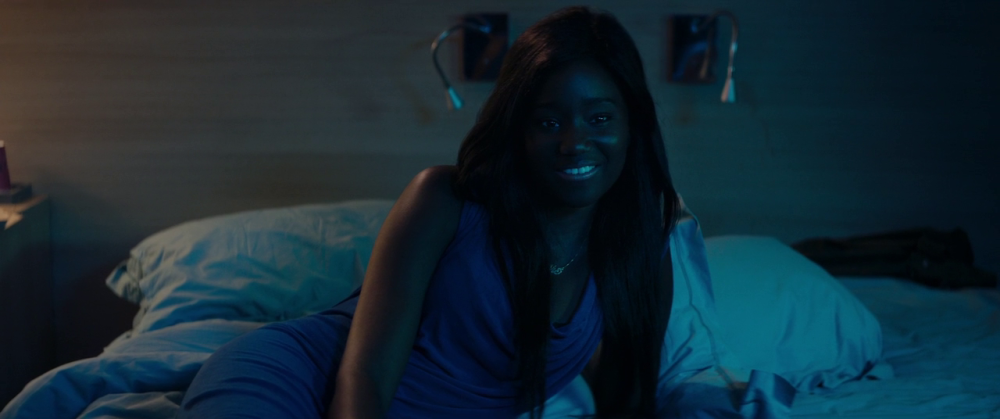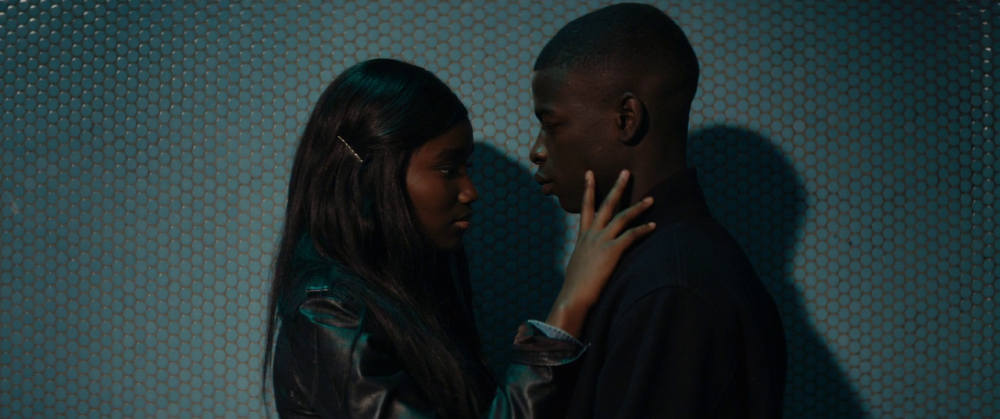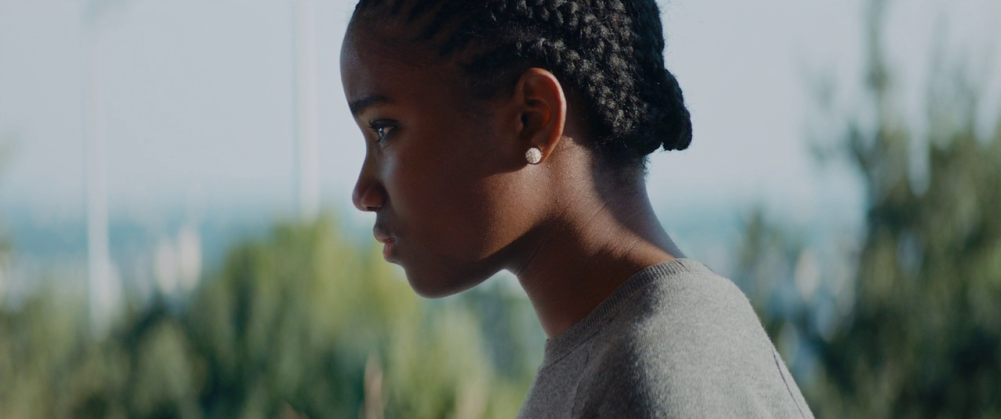Imagine, as a woman, having the luxury of living every single minute of every single day as though you were one of the men you always witness in sports flicks. The game itself is a montage of empowerment; your slow advancement to success, and your victory, depicted through power shots as Light Asylum’s “Dark Allies” blares around you. Even the losers rally around you because this is such an idealized situation. In the stadium — in this moment of victory — it doesn’t matter who you are because you’re at home with others just like you. It’s exactly this that the first few minutes of Céline Sciamma’s Bande de filles (Girlhood) depict, and it all gets reeled back into reality the moment the title card disappears.
From there, a group of young women walk through a city. They chat, they enjoy each other’s company, as the camera trails near them slowly and casually, as though it was one of them. The women grow silent as they enter a certain neighborhood; more importantly, as they’re surrounded by men. That fantasy of solidity in a realm where adversity doesn’t actually mean danger from the very first minutes is shattered immediately by cat-calls, with an overwhelming feeling of being out of place sinking in slowly.
While this is the universe that Sciamma establishes as reality, it’s not quite as bleak as it sounds. At the center of all this is Marieme — played by the incredibly talented Karidja Touré — who embodies every role that men, too often, place women in front of the camera as: a sister, a daughter, a lover too afraid to love out of wedlock, a struggling student, and an outsider. “I want to be like the others: normal,” Marieme says, but because of circumstance and the cards life has handed her – socioeconomic status in particular – she slips into the identity of an outsider.
Until, that is, she meets the titular gang of girls — Lady (Assa Sylla), Adiatou (Lindsay Karamoh), and Fily (Mariétou Touré) — that change her life. With them, a new world opens up; albeit once she’s not entirely used to, and one that seems to look to dominate her at first. They’re the tough gals, though not without reason and emotional propulsion, sort of like The Outsiders in their very own way if you will. They’re here, in part, to offer the lead character a chance to find acceptance, to find her place in the world, just as men throughout existence have been shown to do in these type of coming-of-age narratives over the decades (while women are left on the sidelines).
And, being a Sciamma film, this is all about finding yourself, and finding acceptance. As soon as Marieme is presented with the necklace of her girl group, she is “crowned” as Vic, and as such, has found a home that feels right in the now. “Vic as in victory,” Lady tells her, immediately after reminding her that she can be the kind of woman who can do what she wants. Home, for Vic and the others, feels a whole lot like that first scene. In this world though, power isn’t determined by the same kind of brute force we often see in football. In the hotel room that the girls buy with the money they’ve stolen off the meek, they exist in a world where power has nothing to do with gender (or race, or sexuality, as it, sadly, often does in the real world).
It’s in this hotel room that the much-discussed scene set to Rihanna’s “Diamonds” takes place. The girls — beautifully made up, hair straightened rather than braided back, in the fanciest dresses around — simply sing and dance to “Diamonds.” Sciamma and DP Crystel Fournier shoot this in the same way you’d expect someone to shoot a music video, and while in many cases that shift from realism to glossiness might come across as strange, it feels just right in Bande de filles. This is, after all, the ideal night for these young women; why not let the camera take it all the way too?

At first, Vic watches from afar, laying on the bed as her three new friends — with their established relationship — celebrate their victory, their independence, their friendship, their beauty, and their womanhood. As the camera pans closer to Vic’s face, we see the subtle changes in Touré’s face, who I might add has an incredible talent for emotional shifts and that’s why the camera loves her. It’s almost as though we can hear her thinking just by those changes; thinking this is exactly where she belongs. She joins them, and, together now, they sing with vibrance: “We’re beautiful like diamonds in the sky!”*
As Sciamma herself says in an interview with The Muse, “I wanted to put the whole song in the film, not just clips, because it’s so much stronger like this. It is about how a friendship is born and to look at the birth of a friendship through the choreography. It’s about Marieme watching the others being together with this beautiful energy and being synchronized and wanting to get there. Going from spectator to a partner and being in the center of the group and suddenly getting a voice because they are together.” This is where the filmmaker hits her highest high over three films (Water Lilies, Tomboy & Bande de filles) of exploring the need to attain acceptance and the way it impacts the lives of young women negatively and positively.
But not everything about Bande de filles is about embracing what one typically expects from femininity. The girls often succumb to the pressures of the world around them, with men implicitly enforcing a lot of the division between women (and even men). The scenes in which Lady and Vic brawl against rival gangs are exactly opposite of what we see in the hotel room — and exactly opposite of their expected gender roles — and it’s because of that that neither one feels gratuitous in the slightest. It also must be mentioned that, outside of the musical choice, it’s scenes like the brawls that ground Bande de filles in the now with their recording of the first fight resulting in viral videos and a loss of respect that they’d presumably worked so hard to gain.
It’s with the presence of the men that surround these girl groups that we get a fascinating skewing in what it means for Vic to embrace her womanhood. Sciamma toys with the notion of gender roles and expected stereotypes in the way that Vic draws upon the men around her for features that will help her survive. She, like many around her, fight in these brawls much like men have for decades to establish dominance. She borrows from her brother’s ability to instill fear in his sibling to force her sister out of falling into a similar situation as the one she’s in. She borrows from the drug dealers she works with to the point of completely hiding her femininity in hair and clothing that makes her look like one of the men she’s with; baggy sweaters, hair braided back and pulled up, lounging around with the bros eating pizza, watching football, and talking about women.
And yet, between all these scenes of Vic drawing upon masculine features, we’re constantly thrown back into Vic embracing her femininity in different ways. After such a manipulation of her sister, she realizes her fault and immediately reverts to treating her as she should be treated: with love. In this scene, and throughout the film, Vic slips into the role of the matriarch, but never is she limited to that. After dominating in the fighting ring, Vic stills heads out with her friends to dance, specifically with Lady, and show off their choreography to J Dash’s “Wop”. There isn’t a man in sight, and they’re all just happy to revel in having a good time and being in the presence of other women looking to do the same.
It’s why, in ways both contrasting and complementary, a much later scene where Vic, in her masculine aesthetic, dances with a woman at a party with drug dealers, is so interesting in the way Sciamma depicts the positive influence that Vic has on other women. The scene, a first dance to “Slow Down” — a tune by Frida Sundemo and Para One, who have provided music for all of Sciamma’s features — is shot as though it’s the perfect romance, completely and utterly in the moment until it’s penetrated by an unwanted male presence.

Contrary to what a very minor but vocal critical dissention might have you believe though, Bande de filles does not depict every man in a negative light. In fact, outside of Vic’s constant drawing upon their features for the sake of crafting her own identity, her relationship with her boyfriend-of-sorts, Ismaël, is endlessly fascinating. Even though she knows that their relationship can never be public because of existing pressure from those around them, notably her very brother, Vic constantly makes the first move and allows herself to indulge in the pleasure that comes with being attracted to him. It’d be impossible to cover their entire relationship without writing another essay all about them, but one scene is particularly impacting in how it depicts female sexuality.
Vic visits Ismaël late one night, ignoring any boundary in her way. She stands in his room and awakens him with a simple gesture: running her hand down his arm. It’s the kind of touch that’s riddled with sexual desire, and yet an admittedly innocent one. “Undress,” she says as he awakens, and she doesn’t let him stop until he’s fully nude (albeit under a bedsheet) and turned over on his stomach. The camera lingers over his body, very much in the same way that it would be as though Vic were watching this scene unfold herself. And when she reaches over to run a manicured hand down his back, slowly trailing down every inch until she rests it on his ass. It’s another gesture that isn’t particularly lewd, but dripping with sexual intent regardless because of the way Sciamma and Fournier embrace the female gaze. This moment is all about a woman reveling in the fact that she has such a beautiful man undressed in front of her, and the intimacy and eroticism that comes with it is an absolutely refreshing play on the way the scene would have unfolded in your typical male-driven narrative.
As with Water Lilies and Tomboy, Bande de filles is all about trying to understand one’s own identity and finding acceptance along the way. Every scene prior to the very last shot of the film (and even half-way through that), we have no assurance that Marieme/Vic has a full understanding who she is. And, hell, maybe she never will. But Bande de filles beautifully depicts that journey that everyone — and especially those who feel marginalized in some way, be it due to gender, race, or sexuality — goes through in figuring that out. The look of determination that Karidja Touré sports in that final shot speaks volumes about the woman that Céline Sciamma has written here. No matter what gets thrown her way, no matter what expected role she has to manipulate to make it, she’s going to find herself, and that’s what coming-of-age is all about.
—
*It has to be noted that Rihanna’s “Diamonds” will likely never again be used to create such impacting imagery and that’s A-OK by me.
Directed by Céline Sciamma; written by Céline Sciamma; starring Karidja Touré, Assa Sylla, Lindsay Karamoh, Mariétou Touré & Idrissa Diabaté; 113 minutes.
Bande de filles (Girlhood) is currently undergoing a limited theatrical release.
In Miami, it is showing exclusively at the Miami Beach Cinematheque starting Friday, March 20th. On Saturday, March 21st, after the 6:30PM showing and prior to the 9:10PM showing, there will be a reception to meet both Karidja Touré and Assa Sylla. On Monday, March 23rd, I will be joining the chief film critic for L.A. Weekly, Amy Nicholson, to discuss the film at the Cinematheque’s Speaking in Cinema program with Touré and Sylla.




 Derek
Derek
 Isabelle
Isabelle